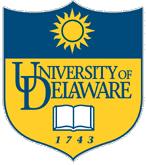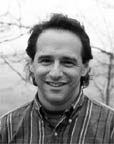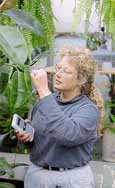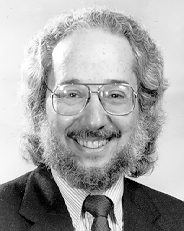 |
SCIENCE EDUCATION SEMINAR SERIES |
 |
 |
SCIENCE EDUCATION SEMINAR SERIES |
 |
The University of Delaware's Howard Hughes Medical Institute
Undergraduate Education Program will co-sponsor presentations by three
distinguished science educators this semester. These speakers intend to
promote and provoke interdisciplinary discussion about teaching and learning
issues in undergraduate science education. Faculty, graduate students,
undergraduates, and high school teachers are encouraged to attend.
Our first visitor will be William J. Vining from
the Department of Chemistry at the University of Massachusetts (February
1 & 2) followed by Carol Brewer from the Department
of Biology at the University of Montana (April 9 & 10) and Joe
Redish from the Department of Physics at the University of Maryland
(May 2). They are co-sponsored respectively by the Departments of Chemistry
& Biochemistry, Biological Sciences,
and Physics & Astronomy.
 |
William
J. Vining
Department of Chemistry, University of Massachusetts February 1 & 2, 2001 |
Seminar: "Use of Guided Inquiry Simulations and
Intelligent Tutors in Teaching Science"
4:00 PM, Thursday, February 1, 2001
214 Brown Laboratory
Refreshments at 3:45 PM in 214 Brown Laboratory
Workshop: "Creation and Use of Simulations for Teaching
Science through Guided Inquiry"
9:30 - 11:30 AM, Friday, February 2, 2001
116 Pearson Hall
Bill's principal interests lie in "developing and testing educational materials and methods for chemistry. The materials are primarily computer-based multimedia software systems that serve the dual purpose of simulating the exploratory nature of chemical investigation and also make use of graphical advantages of computer systems to better explain chemical concepts. The focus of these programs is to enable students of chemistry to explore chemical concepts in a manner that leads them to discover those concepts independently." He and his group "have prepared materials appropriate for use in general, organic, inorganic, physical, and analytical chemistry." His recent projects include "work on a CD-ROM textbook for general chemistry and modules for organic chemistry."
 |
Carol
Brewer
Division of Biological Sciences, University of Montana April 9 & 10, 2001 |
Brown Bag Lunch with faculty interested in K-12 activities.
12:30 PM, Tuesday, April 10, 2001
105 Pearson Hall (MSERC)
Seminar: "Connecting Teaching with Learning: Engaging
Students in Science Inquiry in the Lecture Hall"
4:00 PM, Tuesday, April 10, 2001
104 Gore Hall
Refreshments at 3:45 PM
Abstract:
“I loved [learning about] subjects that normally would
not be addressed in a freshman course. I enjoyed how relevant the material
was. We focused more on concepts and application than on small details,
which was very good. I enjoyed hearing about the professors’ research and
their encouragement to us.” -- Student in Introductory Biology
Course (Bio 103) -- Spring 2000 --
How can a science curriculum be organized to “induce students to enjoy science from the first day” of their training? According to Project Kaleidoscope, the answer is to connect the student into the community of scholars, personalize the learning experience, and place science in context. In this presentation, I will talk about how we have engaged more students in their learning, and implemented straight-forward methods of “classroom research” to help us strengthen the connection between teaching and learning. In biology courses at the University of Montana, we have implemented several teaching strategies throughout our curriculum to better connect teaching with student learning. In this presentation I will focus on our first year biology sequence. Working in teams, biology faculty have developed a two semester course sequence organized around research themes that: 1) dovetail with areas of active research in biology, and 2) relate broadly to major content areas in the life sciences (e.g., genetics, growth and development, evolution, physiology, ecology, cellular and molecular biology, behavior). Faculty teams have chosen to forgo extensive coverage to emphasize depth of understanding instead; the central foundation in this sequence is experiential, investigative, hands-on learning where process skills and content are balanced and integrated. Lectures, seminars and laboratories are linked through relevant content and feature inquiry-based instructional methods. I also will present data on student attitudes and confidence in their ability to learn science. Over the last three years of implementation, final course grades have risen, student-rated perceptions of course difficulty has risen, and teaching evaluations have improved. Moreover, faculty participants have appreciated opportunities to collaborate and engage each other about not only what we teach, but how to teach most effectively.
Carol Brewer is actively involved in science and ecological education reform efforts at local, national and international levels. To improve ecological and science literacy, she works on improving methods for training future scientists, teachers and the lay public. Her recent and on-going projects include training teachers to use their schoolyards for leading ecological investigations, developing opportunities for long-term ecological research studies for pre-college students in western Montana, and improving instruction in large lecture courses. In September 1998, she began directing Project IBS-CORE (Integrated Biological Science Courses Organized Around Research Experiences), a new initiative funded with a grant to the University of Montana from the Howard Hughes Medical Institute.
 |
Edward
J. "Joe" Redish
Department of Physics, University of Maryland May 2, 2001 |
Seminar: "The Hidden Curriculum: What do we really
want our students to learn?"
4:00 PM, Wednesday, May 2, 2001
103 Gore Hall
Refreshments at 3:45 PM in 225 Sharp Laboratory
We are rarely explicit about what we want our students to learn in introductory college or university physics. We often say we want them to "learn problem solving", but we usually have in mind complex, expert problem solving skills. In practice, we usually test for algorithmic problem solving and pattern matching skills -- something quite different. I refer to this gap between what we want and what we do as representing a "hidden curriculum". At the University of Maryland, the Physics Education Research Group has been exploring some of the components of the hidden curriculum -- concept learning and cognitive attitudes towards physics. Our results, and the results of other physics education research groups, are beginning to clarify the nature of the difficulties with traditional teaching methods and to demonstrate some effective ways to improve our instruction.
Some References:
"Implications of Cognitive
Studies for Teaching Physics", E. F. Redish, American Journal of Physics,
62, 796-803 (1994).
"On the effectiveness of active-engagement microcomputer-based laboratories," E. F. Redish, J. M. Saul, and R. N. Steinberg, Am. J. Phys. 65, 45-54 (1997).
Student expectations in introductory physics, Edward F. Redish, Jeffery M. Saul, and Richard N. Steinberg, Am. J. Phys. 66, 212-224 (1998).
Teaching physics: figuring out what works, Edward F. Redish and Richard N. Steinberg, Physics Today 52, 24-30 (January, 1999).
Since 1982 Joe has been actively involved in the subject of physics education using the computer. He was founder and co-principal investigator of the Maryland University Project in Physics Education and Technology (M.U.P.P.E.T.) and Comprehensive Unified Physics Learning Environment (CUPLE). His current research effort is devoted entirely to physics education. For more information, see the homepage of the Physics Education Research Group (PERG) at the University of Maryland.